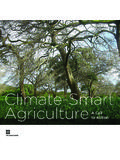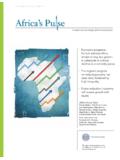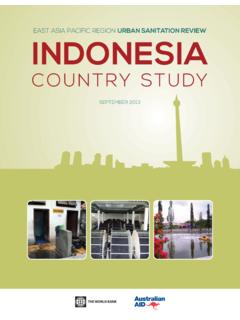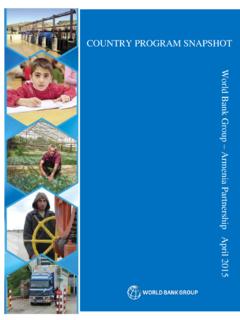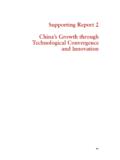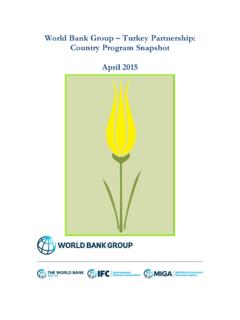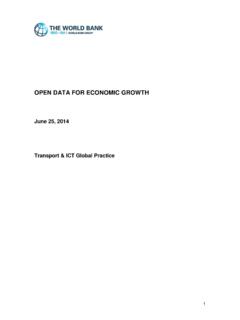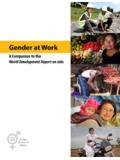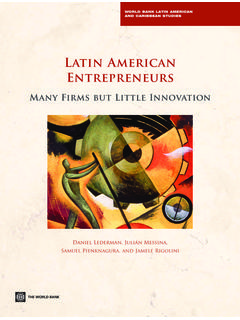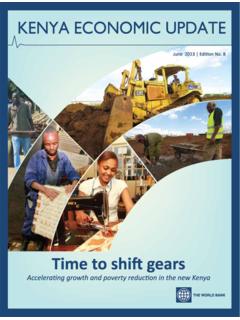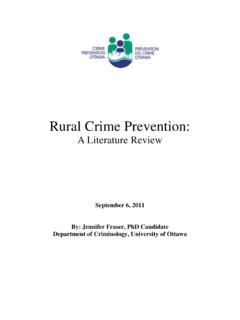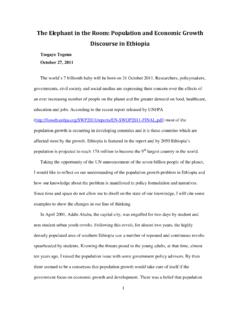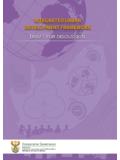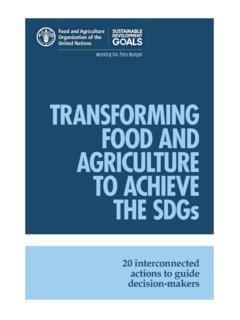Transcription of Skills for Solomon Islands - World Bank
1 1 October 2012 Skills for Solomon IslandsOpening new opportunitiesWB001 BKL Solomon Skills 128/03/13 9:05 AM2 Solomon Islands needs new sources of growth to open opportunities for its young and rapidly expanding population. Firms report that if they could find employees with the right Skills they could add over 50 percent more jobs. Yet only about 20 percent of 15 24 year old Solomon Islanders are employed,1 while over 40 percent of youth are Seven out of every ten Solomon Islanders are under There is a serious Skills deficit in Solomon Islands , constraining its people from taking advantage of the economic opportunities available to them. Functional literacy rates in major provinces are as low as seven to 17 percent. A lack of basic cognitive Skills is a major constraint to formal and informal sector work. The key message of this report is that loosening this constraint will require action in a number of areas, and not only Technical and Vocational Education and Training (TVET ).
2 This report explores the demand for Skills from current economic opportunities, the mismatch with Skills available, constraints to forming Skills demanded, and how to address this growth constraint through current initiatives and further action. New economic opportunities are emerging at home in exploitation of natural resources and tourism, and for work overseas, including through seasonal employment schemes. But Solomon Islands faces a shortage of workers with the Skills needed to take advantage of emerging opportunities. The result is that Solomon Islands imports labour to fill Skills shortages, even while up to 80 percent of youth in Solomon Islands are unemployed. Employers report a lack of key behavioural as well as technical Skills , contributing to staff shortages which constrain growth. The basic literacy and numeracy needed to boost productivity is lacking. Formal and informal self-employment and enterprise is further constrained by a lack of entrepreneurial, financial management and livelihood Skills .
3 The problem begins with the absence of basic cognitive Skills . Available evidence suggests that the lack of functional literacy may be a major constraint on the life and livelihoods of many Solomon Islanders. Literacy and numeracy are widely perceived as important to daily life. Yet the Asia South Pacific Association for Basic and Adult Education/Coalition for Education Solomon Islands (ASPBAE/COESI) 2007 survey of Honiara and Malaita reported an average functional literacy rate of only 17 percent. This matches the rate recorded in the 2010 survey of Isabel province presented in this report. Solomon Islands has significantly improved access to education in recent years, raising its net primary enrolment rate to 91 But too few primary students learn to read and write to a functional level: the survey of Isabel province showed that only 22 percent of those currently enrolled in primary school are functionally literate. Ministry of Education & Human Resource Development (MEHRD) data from its Solomon Islands Student Testing and Assessment (SISTA) survey show that 68 percent of Standard 4 students perform less than satisfactorily in literacy and numeracy.
4 In Solomon Islands National Literacy Proposal, the MEHRD identifies illiteracy as a major factor in limited socio-economic development and social problems including poor health and sanitation, lack of economic diversification, poor natural resource management, low employment, and low participation in community and Based on the measure in the 2006 HIES including those Not working AND actively looking for employment (including subsistence activities). However, figures vary greatly (as further explored in the full report, Skills for Solomon Islands : Opening New Opportunities , World bank , Sydney, 2013). 2 Inactive in the labour market is defined as those who are not in school, not working, and not looking for a job. This includes the truly inactive, those active in non-market activities, and other reasons. 3 UNDP and Pacific Island Forum Secretariat: Urban Youth in the Pacific: Increasing resilience and reducing risk for involvement in crime and violence, Solomon Islands Government, Ministry of Education and Human Resource Development, Solomon Islands Government Ministry of Education and Human Resource Development: Performance Assessment Framework Report 2007 2009, Solomon Islands , BKL Solomon Skills 228/03/13 9:05 AM1 addressing the challengeLike other Pacific Island Countries, Solomon Islands faces multiple challenges to expanding economic growth, including remoteness and the small size of the private the Skills gap will not resolve all of these but will loosen a key constraint on growth identified by employers.
5 addressing the problem of the Skills mismatch between employer demand and household supply in Solomon Islands is also of increasing importance as the number of labour force entrants grows rapidly. Estimates suggest the labour force could grow by 30 percent between 2010 and It is also important to address now as Solomon Islands prepares for expanding opportunities overseas in labour migration. Policymakers need an understanding of how the education system and the labour market interact in order to prepare Solomon Islanders for employment, and to turn the risk of a youth bulge into an opportunity for growth. Several initiatives are underway in Solomon Islands to address the growth constraint caused by the Skills mismatch. These include investments to expand early childhood education (ECE), improve basic education quality, strengthen the quality and relevance of technical and vocational training provision (through Rural Training Centres), expand youth employability, and to develop a Solomon Islands Qualifications Framework (SIQF).
6 Holy Cross literacy school, Honiara: a volunteer teacher and intermediate English at St Augustine Kindergarten, Auki, on current initiatives, Solomon Islands needs a range of further coordinated actions addressing the transition from early childhood through school to work. Such an approach will help effectively address the human capital constraint to growth and better prepare Solomon Islanders for better life outcomes and new opportunities in enterprise, whether formal or informal, and increasingly, overseas. The approach needs to support development of cognitive, technical and behavioural Skills to help provide Skills needed for employment. Second and multiple chances to learn both basic and livelihoods Skills are needed. The transition from school to work could also be better supported with broader access to secondary- and post-secondary education and pre-employment services. Expenditure on education and training can be allocated and incentivised to ensure support for training relevant to economic opportunities available for more Solomon World bank , Luthria, M.
7 , Home and Away: Expanding Job Opportunities for Pacific Islanders Through Labour Mobility, Washington, BKL Solomon Skills 128/03/13 9:05 AM2 Recommendations1. Starting early Given the concerns with low literacy and numeracy and the limited access to ECE (34 percent net enrolment in 20107), it is important to continue to grow ECE with a focus on core learning Skills such as reading and maths. Furthermore, expanding integrated early childhood development (ECD) with nutrition and health would lead to better long term life Learning for all including second chance education Of 2010 survey respondents without any schooling, none were functionally literate, and 65 75 percent of primary school completers were not functionally Second chances are therefore important. To ensure learning for all, Second Chance Education & Training (SCET ) opportunities could be expanded for those who haven t gained adequate Skills from the education system.
8 This includes rollout of the Open Schooling Initiative, and implementing the National Literacy Project (NLP) through civil society. It is important to develop flexible and lifelong learning pathways linking formal and non-formal education to enable people to gain Skills throughout their lives. Additionally, to achieve education goals, public expenditure needs to be rebalanced away from tertiary scholarships and towards basic, secondary and second-chance education, so that more Solomon Islanders benefit from the Government s investments in education. 3. Building a job-relevant Skills supply to address the Skills mismatch The Cabinet Ministers of Solomon Islands met and endorsed the National Human Resources Development and Training Plan (NHRDTP), a national Skills strategy to orient Skills supply to demand. The priority now remains to implement the NHRDTP s five programme areas.
9 Expanding access to secondary education will help make a bigger impact on employment, productivity and growth than primary education alone. Progressing the significant TVET reform agenda will help meet employer concerns about the quality and relevance of vocational training. Expanding access and livelihood-relevance of Rural Training Centres (RTCs) beyond the 2,000 3,000 places currently available will particularly benefit rural Solomon Improving the relevance to employers of RTC training could be encouraged through incentive-based funding. Access to post-secondary education needs expanding, but with shorter, local, more incentive-based training and diversified financing sources. Youth Employment Approaches can be sustained and supported to benefit the urban and rural poor, youth and women, as well as comprehensive employment services programmes to support the transition to work. Expanded income generation opportunities are needed for Solomon Islands 80 percent rural majority, and include mobile village Skills training and community-based, income-generating, short courses in rural as well as urban Encouraging entrepreneurship and innovation by creating a favourable environment for self-employment, entrepreneurial and Information and Communication Technology (ICT) opportunities Solomon Islands could reduce barriers to expansion of business by: increasing chances to upgrade entrepreneurial and livelihood Skills ; improving procedures for finance, land registration and immigration; and Skills acquisition in activities that are frequently conducted informally (such as animal husbandry or sustainable local forestry management practices) through the SIQF.
10 Given geographic challenges, expanding access to ICT is essential for economic development opportunities as well as opportunities to deliver Skills training through distance Solomon Islands Government Ministry of Education and Human Resource Development: National Education Action Plan 2013 2015, Solomon Islands , ASPBAE/COESI, EU, Labour Market and Community Skills Needs Analysis, Integration of Vocational Education and Training into the Formal and Non-Formal Education System in Solomon Islands . Project Number SI/01/20010, report proposes priority areas for further action using a comprehensive conceptual framework developed by the World bank : the five-part Skills Toward Employment and Productivity (STEP) framework. The findings of the Literacy and Educational Experience Survey presented in this report make a particularly strong case for developing basic reading and numeracy Skills , as per Step 2 below. Second Chance Education programs are one of the options available for Solomon Islanders to address this widespread Skills deficit.
